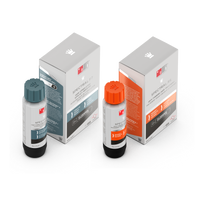Most people associate hair loss primarily with men. However, it is almost as common for women after menopause. About 40% of all women will experience hair thinning. This can be very upsetting, especially since menopause is often stressful even without hair loss. Fortunately, there are many options for mitigating or even reversing hair thinning from menopause.
How To Combat Thinning Hair from Menopause
Translation missing: en.blogs.article.author_on_date_html
Why Menopause Causes Hair Thinning
The most significant factor in hair thinning due to menopause is related to hormones. During pregnancy, many women experience fuller, thicker hair due to higher levels of female hormones, namely estrogen and progesterone. Unfortunately, as hormonal levels drop during menopause, the opposite can happen.
Additionally, during menopause, the impact of androgens (male hormones) can increase. This can also cause hair thinning.
This type of hair loss is called androgenetic alopecia or female pattern baldness. It is the same type of hair loss as many men experience.
Women’s hair typically thins consistently across the scalp. This differs significantly from male pattern baldness which is normally focused on the hairline and top of the head.
As a result of hormonal changes, hair follicles on the scalp get smaller and tend to spend more time resting and less time growing new hair. Eventually, they will spend so little time growing hair that new hairs will not sprout from those follicles. Furthermore, the smaller and less healthy follicles will tend to produce thinner and weaker hair.
Some women also develop light facial hair during menopause. This is caused by the same hormonal shift and the greater impact of androgen.
Contributing Factors
The hormonal component is the most common and most significant factor in hair loss during and after menopause. However, it is not the only factor.
Stress is a very common contributing factor. This can lead to temporary or permanent hair loss. Other hormonal imbalances, most notably related to the thyroid, can cause hair loss even without menopause. It can make thinning hair worse.
Your body needs nutrients including iron and vitamin C to grow new hairs. If you have a nutritional deficiency, it may cause or worsen hair loss.
In some cases, doctors recommend replacing declining testosterone (yes, women also have testosterone) levels to help manage other menopause-related health issues. Unfortunately, this can contribute to hair loss.
Strategies for Minimizing Hair Loss
The good news is that menopause-related hair loss does not need to be a permanent problem. Typically, the best solution is a combination of addressing the underlying factors and using a hair health treatment. Try starting with a few lifestyle changes such as the following:
-
Manage Stress: Try some strategies for keeping your stress levels under control. Breathing exercises, yoga, meditation and regular exercise can help significantly. Additionally, try to dedicate some time to self-care every day.
-
Improve Diet: Focus on eating a solid, balanced diet. Avoid crash or overly restrictive diets. Make sure you are eating plenty of vegetables, fruits and whole grains. Also, try to include monosaturated oils such as sesame oil and olive oils. Fatty acids from salmon, tuna, walnuts, flaxseeds and similar sources are also helpful.
-
Exercise: It probably comes as no surprise that regular exercise is good for your health. This includes your hair health. Regular activity can reduce stress and help fight symptoms of menopause such as insomnia, mood instability and weight gain.
-
Stay Hydrated: Drinking water consistently will help substantially with hair health. Try to avoid sugary drinks such as juice and soda.
- Talk With Your Doctor: Mention the issue to your doctor and talk about what you can do to help your hair loss. Many of the underlying causes of hair thinning are very individual and may depend on your medical history and medications. Your doctor may be able to adjust some medications to help with the issue.
As you can likely tell, these strategies are as much for living a healthy life as for minimizing hair loss. Your hair will generally fare significantly better if you are kind to your body.
Products You Can Use For Thicker, Fuller Hair
While the above techniques can help you keep your hair healthier, they will not undo hair loss. Furthermore, they are not addressing the hormonal component. Fortunately, there are some hair health products that can help.
-
Revita Shampoo and Conditioner: These two products address your androgenetic alopecia by blocking some of the androgens in the scalp. Additionally, they have ingredients such as biotin, copper peptides, and procyanidin B2 to promote increased and healthier hair growth. This will help you get fuller and more luscious hair.
-
Spectral.CSF: This topical treatment includes Nanoxidil, a powerful vasodilator. It opens up the blood vessels in your scalp, bringing nutrients and oxygen to the follicles. Nanoxidil is very similar to minoxidil but without the side effects. The treatment also includes copper peptides, adenosine, azelaic acid and other proven hair health ingredients.
- Revita Tablets: If you want a supplement that will help with your hair health, consider Revita Tablets. They include zinc, iron, Canadian willowherb, procyanidin B2 and other important nutrients that support hair health.
Place Your DS Laboratories Order Today
If you are ready to take on your thinning hair, explore the full catalog of DS Laboratories hair health products. We use clinically proven ingredients to help men and women achieve healthier, fuller heads of hair. Check out our hair assessment to find the ideal products for you. Then, place your order. You don’t have to settle for thinning hair.

















